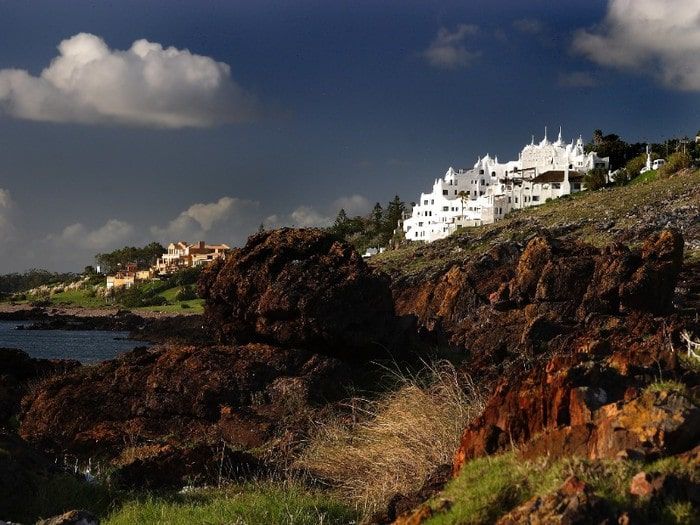Uruguay's plan to attract foreigners and repopulate the "little country" of 3 million inhabitants
The "small country" of 3 million inhabitants: Uruguay's population of about 3.5 million has remained virtually the same for 30 years.

One of the first plans announced by President-elect Luis Lacalle Pou, who takes office on March 1, is to try to increase the size of the Uruguay population, and part of his plan includes facilitating the entry of foreign residents. The center-right politician announced a few days ago that he will launch a package of measures to relax the current residence rules, both bureaucratic and fiscal, in order to attract foreigners to the country.
"Uruguay has always been a country with open arms for countries that are expelling their people, Venezuelans, Cubans, and others," the president-elect said previously. And he added: "But it is also a place for people who are not having a bad time to say that here it is a place where investment is respected, where it is good to bring your family to live and where there is legal certainty.
For his part, the president of Argentina, the Peronist Alberto Fernández, also spoke of the efforts of the Frente Amplio governments to stop Uruguay from "being a tax haven" and from "being favored with money obtained spuriously elsewhere. On the plan to attract Argentines in particular, former President José Mujica said: "Instead of bringing 100,000 Argentine cagadores (fraudsters), let's worry about having our own invest here.
"We have about US$24 billion scattered around the world, why don't we try to get some of that money to come into the country," he added. Other critics said that Lacalle Pou intends to attract "mainly the rich" in order to stimulate the Uruguayan economy. President Tabaré Vázquez said it was "not easy" to implement his successor's initiative, but said "it would be much better to have six million people" as an economic engine.
What kind of foreigners are they looking for?
In an interview with BBC Brazil, future tourism minister Germán Cardoso said Uruguay is inspired by European Union (EU) countries, especially Portugal, to increase its population and "activate" its economy without "damaging" the country's fiscal integrity. "We do not want illicit capital, but families and investors who show their resources, who want to live and prosper in our country," Cardoso said by telephone.
According to him, Uruguay can be defined as "an island of prosperity and tranquility" because it offers "quality schools and universities," as well as "higher public security rates than the countries in the region," and good quality of life. Currently, Uruguay asks a foreigner who wants to obtain residency to invest approximately US$1.8 million in an Uruguayan property or business and stay in the country for at least six consecutive months.
For Cardoso, such requirements "make it difficult" to attract residents from other countries. The minister says there is a set of bills that will be sent to Parliament with a priority request to expedite their processing. A foreign resident, he explains, must still prove that he wants to invest and settle in the country, but without the obligation to spend six months without traveling abroad and with a lower amount of investment.
"We believe we can reduce this level to the levels of Portugal, for example, which is around US$500,000," Cardoso says. Other ties will also be considered for granting residencies, such as if a family enrolls its children in Uruguayan schools or universities. "The current rules make it difficult for us to attract more residents. What we want is for it to be more flexible, without harming international principles and with clear rules," the minister said. "Here in Uruguay, we have the characteristic of respecting the rules, even with changes in the government's ideological line. What we want to do is facilitate the arrival of more inhabitants," he said.
"More cows than people"
Uruguay's intention to expand its population is not new, as noted by historians and analysts interviewed by BBC Brazil. In the country, called a "paisito" by its inhabitants, there are even "more cows than people", as the proportion is more than three cattle per inhabitant. As the organizer of the Uruguayan population study program, Uruguayan historian Adela Pellegrino, a retired professor at the University of the Republic, highlighted some of the factors that would explain the country's low population density.
"Uruguay followed a path similar to the European one, which we call demographic transition. When mortality starts to decrease, fertility eventually decreases and the population becomes stable (and older)," she explained. "In addition, the level of education contributes. In the case of Uruguay, we understand that the training of women, both in terms of education and citizenship, ended up contributing to lower fertility", she continues.
According to the expert, it is "intriguing" that Uruguay has attracted immigrants in a trajectory similar to that of Argentina in the 19th century, but did not have a population increase like the rest of Latin America, a region that had one of the highest population growth rates in the world. This is not the first time that an Uruguayan government has tried to attract migrants, she recalls: "Our small population and its effects are a reality. And every government that arrives has a project. But many have not been efficient. We'll see what happens now," says Pellegrino.
Uruguay, in fact, has a 2008 law that, also to attract people from abroad, facilitated residency procedures, says Luciana Méndez, an economist and researcher at the University of the Republic. "Uruguay is a country that is very open to immigrants and the residency procedure is simple and agile, and it is necessary to prove basic things, such as not having a criminal record," says Méndez.
"The 2008 law establishes, for example, that residents who arrive from abroad have the same rights as Uruguayans to access health and public education and to work since with the provisional identity card you can now enter the labor market," she explains. However, she believed that the new government's migration policy should also take into account that approximately 13 percent of the Uruguayan population lived abroad.
"There are many qualified people, with doctorates and other skills, who left the country during the military dictatorship in the 1970s, or were somehow expelled due to the economic crisis in 2001," she said. "A comprehensive and serious immigration policy should include them as well, whether in terms of economic or academic ties," Mendez added.
Insecurity
Public security is one of the biggest concerns of Uruguayans today, especially those living in the interior of the country, said Gerardo Caetano, a professor of political science at the University of the Republic. Cardoso, the future tourism minister, tells BBC Brazil that although the "deterioration" in the area of public safety was one of the reasons behind Lacalle Pou's election, the country "is still very safe, compared to others in the region, and addressing the problem is a government priority.
According to official data, Uruguay ranks fourth in South America in terms of the number of homicides, with a rate of 11.8 per 100,000 inhabitants, behind Venezuela, Brazil, and Colombia. However, other international rankings, like that of the Mercer consulting firm, point to the Uruguayan capital as "the best place to live" in Latin America.




